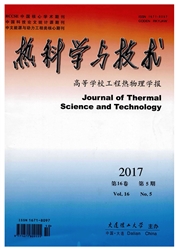

 中文摘要:
中文摘要:
十四烷是工业中最常用的液态烷烃之一,常被用于有机溶州,有重要的应用价值。相比于纯烷烃,烷烃基纳米流体具有许多优异的性质,特别是导热系数的增强。采用实验与理论模型对比的方法,对一些影响十四烷基纳米流体导热系嗷的因素进行研究,包括纳米颗粒种类、浓度、温度以及稳定性。结果表明,纳米流体的有效导热系数随纳米颗粒体积分数的增加而增加,随温度的升高而下降;在各种纳米颗粒中,碳纳米管对导热的增强最为显著,且碳纳米管流体具有最好稳定性。
 英文摘要:
英文摘要:
Tetradecane, as one of the most commonly used organic solvent in industry, has important application value. Compared with pure paraffin, paraffin base nanofluids have many excellent properties, especially the enhancement coefficient of thermal conductivity. In this paper, some factors that can increase nanofluid thermal conductivity were studied, including particle type, concentration, temperature and stability. The results of the experiments were compared with the predictions of two theoretical models. The results show that among all the nanoparticles adding carbon nanotubes can significantly increase thermal conductivity of the base fluid. The nanofluid thermal conductivity increases as the nanofluid volume fraction increase and decreases as temperature increases. Among all the nanofluids studied, the carbon nanotube fluid has the best stability and the best thermal conductivity enhancement effect.
 同期刊论文项目
同期刊论文项目
 同项目期刊论文
同项目期刊论文
 A 3-D numerical heat transfer model for silica aerogels based on the porous secondary nanoparticle a
A 3-D numerical heat transfer model for silica aerogels based on the porous secondary nanoparticle a Experimental and analytical analyses of the thermal conductivities and high-temperature characterist
Experimental and analytical analyses of the thermal conductivities and high-temperature characterist Wetting kinetics of water nano-droplet containing non-surfactant nanoparticles: A molecular dynamics
Wetting kinetics of water nano-droplet containing non-surfactant nanoparticles: A molecular dynamics Effects of Free Surface Evaporation on Water Nanodroplet Wetting Kinetics: A Molecular Dynamics Stud
Effects of Free Surface Evaporation on Water Nanodroplet Wetting Kinetics: A Molecular Dynamics Stud Effects of solid-gas coupling and pore and particle microstructures on the effective gaseous thermal
Effects of solid-gas coupling and pore and particle microstructures on the effective gaseous thermal 期刊信息
期刊信息
